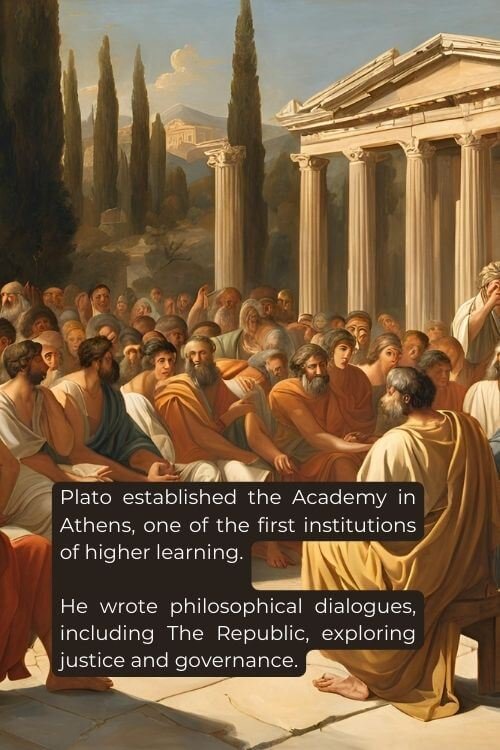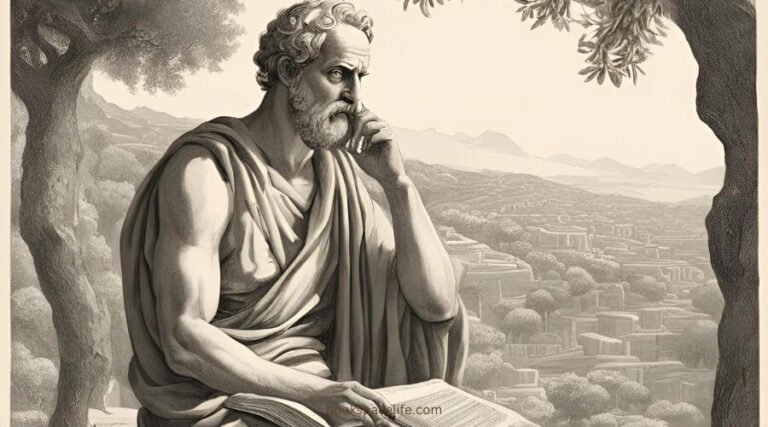Thales of Miletus
Plato: The Philosopher of Forms
Plato (428 – 348 BCE) stands as one of the most influential figures in Western philosophy, shaping not only the course of philosophical inquiry but also the foundations of political theory, ethics, metaphysics, and epistemology.
A student of Socrates and a teacher of Aristotle, his dialogues explore a vast range of subjects, reflecting his profound thoughts on existence, knowledge, and the ideal state.
This blog post examines Plato’s life, including his early education, travels, philosophical contributions, and lasting influence on philosophy and beyond.
Quick Read
Table of Contents
(1) Early Life and Education
Plato was born in Athens into an aristocratic family. His exact birth date is uncertain, but it is generally placed around 428 or 427 BCE.
His family was politically active; his father, Ariston, was said to descend from the kings of Athens, and his mother, Perictione, was related to the famous lawgiver Solon.
Growing up in such an environment, Plato was exposed to the political and philosophical currents of his time.
Plato’s early education was typical for a young man of his status, involving instruction in music, poetry, gymnastics, and philosophy.
He studied under various philosophers, most notably Socrates, who became a major influence in his life.
The execution of Socrates in 399 BCE had a profound impact on Plato, leading him to explore the nature of justice, virtue, and the ideal society in his subsequent works.
After Socrates’s death, Plato traveled extensively. He visited places like Egypt, where he was exposed to ancient religious and philosophical ideas, and Italy, where he encountered Pythagorean thought.
These travels enriched his philosophical outlook and provided him with a broader perspective on various schools of thought.

(2) Philosophical Contributions
Plato’s philosophical contributions are vast and varied, but several key themes and concepts stand out:
- Theory of Forms: One of Plato’s most significant contributions is the Theory of Forms (or Ideas). According to this theory, the material world is a shadow or reflection of a higher, unchanging reality consisting of abstract Forms or Ideas. For instance, while individual chairs may vary in appearance, they all share the essence of “chairness,” which is the Form of the chair.
This distinction between the world of appearances and the world of Forms leads to profound implications for knowledge, ethics, and metaphysics. Plato argues that true knowledge is not derived from sensory experience but from intellectual understanding of the Forms.
- The Allegory of the Cave: In his work “The Republic,” Plato presents the Allegory of the Cave to illustrate the difference between the world of appearances and the world of reality. In this allegory, prisoners are chained in a cave, seeing only shadows cast on a wall by objects behind them. One prisoner escapes and discovers the outside world, realizing that the shadows are mere illusions and that true reality lies beyond.
This allegory serves as a metaphor for the philosopher’s journey toward enlightenment and understanding. It emphasizes the importance of education and the philosopher’s role in guiding others toward the truth.
- Political Philosophy: Plato’s exploration of political philosophy culminates in his ideal state, as depicted in “The Republic.” He advocates for a society governed by philosopher-kings—wise and virtuous rulers who understand the Forms and can create a just society. This idea of philosopher-kings highlights the connection between knowledge and power.
Plato’s political philosophy also explores concepts such as justice, the role of the individual in society, and the nature of the ideal government. He critiques democracy and argues for a system based on merit and wisdom rather than popular opinion.
- Ethics and Virtue: Central to Plato’s philosophy is the idea of virtue as knowledge. He argues that if individuals truly understand what is good, they will act accordingly. This view contrasts with the notion that virtue is merely a matter of habit or social convention. In Plato’s ethics, knowledge and morality are intertwined, emphasizing the importance of philosophical inquiry in achieving a virtuous life.
- Dialectical Method: Plato’s dialogues often feature the Socratic method, a form of cooperative argumentative dialogue that stimulates critical thinking and illuminates ideas. Through this method, Plato explores complex philosophical questions and encourages readers to engage with the material actively. This approach not only reflects the influence of Socrates but also serves as a precursor to modern pedagogical techniques.
(3) Influence and Impact
Plato’s influence on philosophy, politics, and culture is immense and far-reaching:
- Foundation of Western Philosophy: Plato is often regarded as the father of Western philosophy. His exploration of metaphysics, epistemology, and ethics laid the groundwork for subsequent philosophical inquiry. His ideas shaped the course of philosophical thought for centuries, influencing thinkers such as Aristotle, Augustine, and Descartes.
- Academy of Athens: In 387 BCE, Plato founded the Academy of Athens, one of the earliest institutions of higher learning in the Western world. The Academy became a center for philosophical discourse, attracting scholars and students who engaged with Plato’s teachings and continued his legacy.
The Academy flourished for centuries, providing a model for future educational institutions and shaping the way philosophy was taught and studied.
- Political Thought: Plato’s ideas on governance and justice have influenced political theory throughout history. His concept of philosopher-kings and the search for a just society continue to resonate in discussions of political ethics and governance. Political philosophers such as Thomas More, John Locke, and Jean-Jacques Rousseau have drawn on Plato’s ideas to develop their own theories of government and society.
- Legacy in Ethics: Plato’s assertion that knowledge is intrinsically linked to virtue has had a lasting impact on ethical philosophy. His emphasis on rational inquiry and the pursuit of the good life has inspired countless philosophers, including the Stoics and the Neoplatonists, who further developed these ideas in their ethical frameworks.
- Cultural Impact: Beyond philosophy, Plato’s influence extends to literature, art, and popular culture. His dialogues, particularly “The Republic” and “Symposium,” have been studied and interpreted in various artistic forms, including literature, theater, and visual arts. The themes of love, beauty, and the nature of reality explored in his works continue to captivate audiences and inspire creativity.

(4) Conclusion
Plato’s enduring legacy as a philosopher is a testament to the depth and breadth of his thought. His exploration of metaphysics, ethics, and political philosophy laid the groundwork for the development of Western intellectual tradition.
Through the Theory of Forms, the Allegory of the Cave, and his vision of a just society, Plato challenged individuals to seek truth and understanding.
As we reflect on Plato’s life and work, we recognize the significance of his contributions in shaping not only the course of philosophy but also the broader cultural landscape.
His commitment to rational inquiry, dialectical reasoning, and the pursuit of the good life continues to resonate today, inspiring new generations of thinkers and learners.
In an age marked by complexity and uncertainty, Plato’s ideas remind us of the timeless quest for knowledge and the importance of engaging with the fundamental questions of existence, morality, and governance.
His legacy as a philosopher of Forms and the father of Western thought endures, guiding us on our journey toward understanding the world and our place within it.
(A) 7 Quick Facts on Plato
- Born in Athens – Plato was born around 427 BCE into an aristocratic family in Athens, Greece.
- Student of Socrates – He studied under Socrates, deeply influencing his philosophical ideas and methods.
- Traveled to Egypt – Plato traveled to Egypt and possibly Italy, learning about mathematics and philosophy.
- Founded the Academy – He established the Academy in Athens, one of the first institutions of higher learning.
- Wrote Dialogues – Plato wrote philosophical dialogues, including The Republic, exploring justice and governance.
- Theory of Forms – He introduced the Theory of Forms, distinguishing between the material world and ideal forms.
- Influenced Western Philosophy – Plato’s ideas profoundly impacted Western thought, shaping philosophy, politics, and education for centuries.
(B) 10 Quotes attributed to Plato
- The greatest wealth is to live content with little. Emphasizing the value of contentment and simplicity.
- Knowledge which is acquired under compulsion obtains no hold on the mind. Highlighting the importance of voluntary learning for true understanding.
- The unexamined life is not worth living. Advocating for self-reflection and philosophical inquiry.
- At the touch of love, everyone becomes a poet. Suggesting that love inspires creativity and beauty in all.
- Courage is knowing what not to fear. Defining true courage as the ability to discern real dangers.
- Wise men speak because they have something to say; fools because they have to say something. Differentiating between meaningful discourse and empty chatter.
- Reality is created by the mind. We can change our reality by changing our mind. Indicating the power of perception and thought in shaping experience.
- Justice means minding your own business and not meddling with other men’s concerns. Presenting a definition of justice centered on individual roles in society.
- The measure of a man is what he does with power. Suggesting that true character is revealed in how one handles authority.
- You can discover more about a person in an hour of play than in a year of conversation. Emphasizing the insights gained through behavior in less formal settings.








